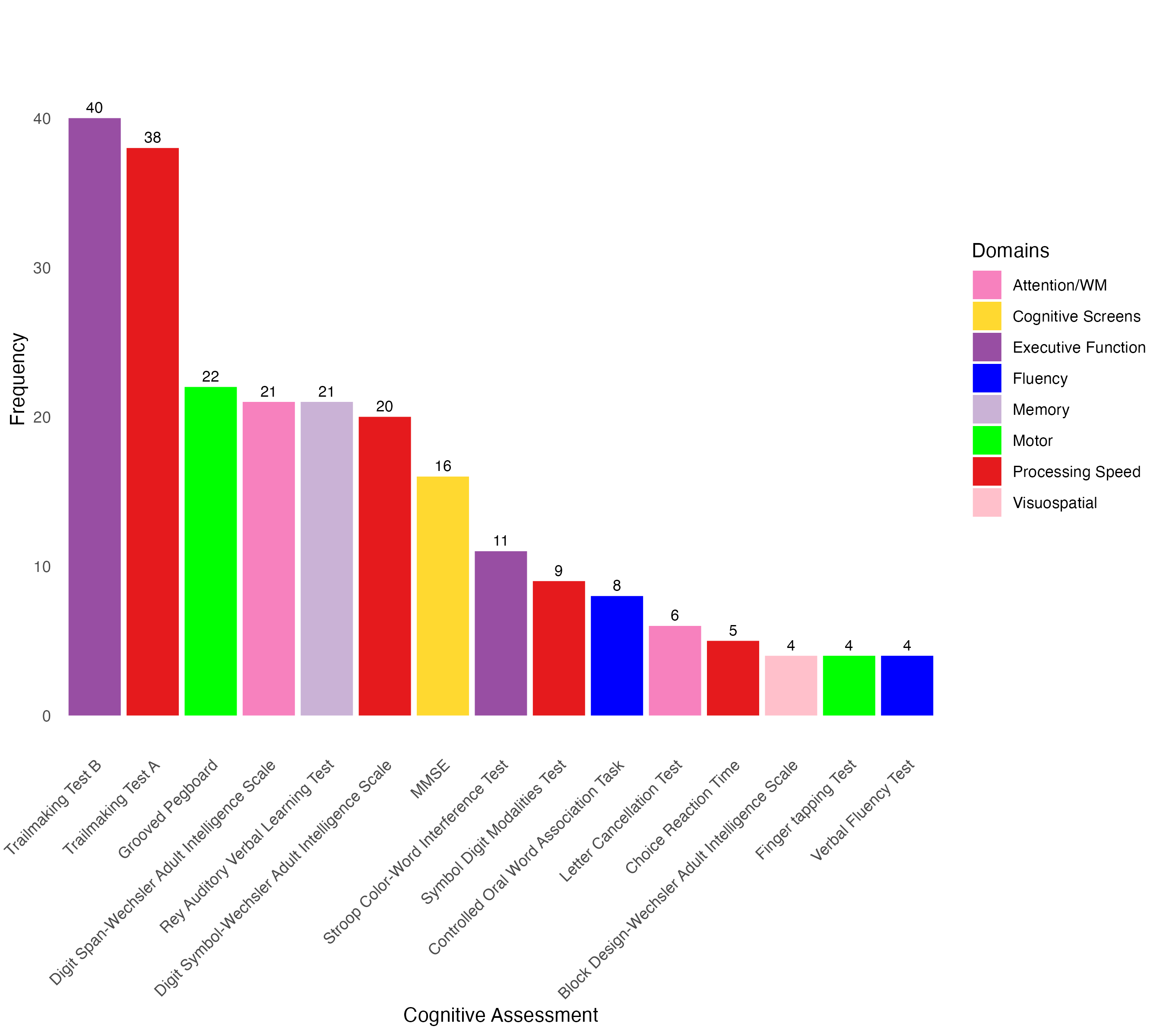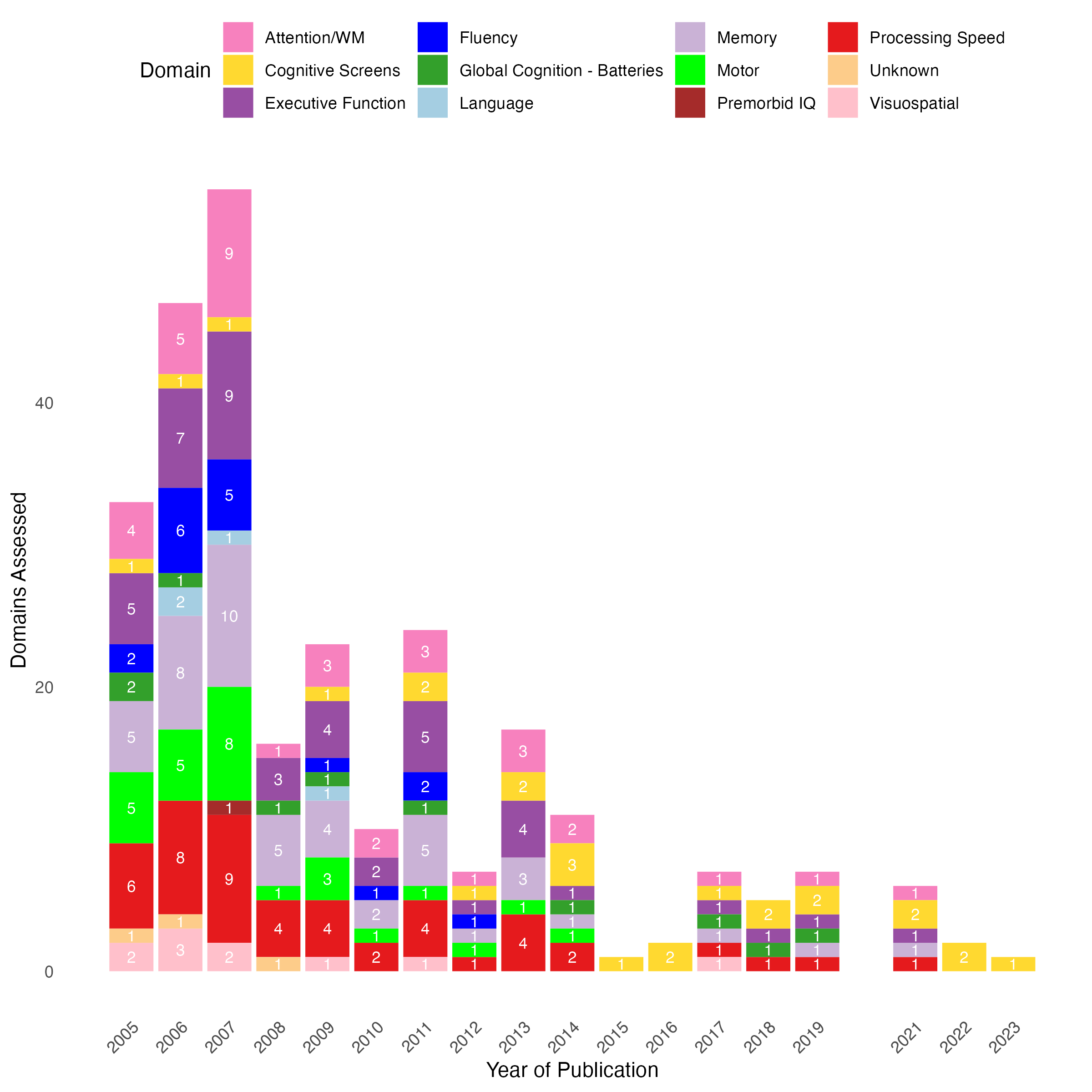Final ID: MDP532
Infrequent Cognitive Assessments in CABG Trials (from 2005-2023) Highlight Need for Improved Strategies for Cognitive Screening post-coronary bypass grafting (CABG) surgery
Abstract Body (Do not enter title and authors here): OBJECTIVE
The incidence of cognitive decline following coronary artery bypass grafting (CABG) is well-documented, significantly impacting patient morbidity, mortality, and quality of life. We conducted a systematic review that examines cognitive outcomes in CABG randomized controlled trials (RCTs) to identify which cognitive assessments were used, their administration frequency, attrition rates, and their effectiveness in detecting perioperative cognitive changes in control groups.
METHODS
We conducted a search of MEDLINE, EMBASE, Cochrane Library, and PsycINFO for CABG RCTs that included cognitive assessments, from January 2005 to December 2023. Descriptive statistics were used to summarize the frequency, domains, and attrition rates of each cognitive task. For tasks assessed both pre- and post-operatively in at least three RCTs, control group scores and standard deviations were reported.
RESULTS
Out of 3337 screened studies, 2163 were CABG RCTs, and only 69 (3.2%) included cognitive evaluations (Figure 1). These trials involved 15,839 subjects (79% male, mean age 64.4, median follow-up time 90 days) and used 145 unique cognitive tasks. The Trailmaking Test Part B (40/69; 58.0%) and Part A (38/69; 55.0%) were the most frequently used. Only 7 tasks had means and standard deviations reported before and after surgery in more than three RCTs, and none detected significant pre- to post-operative changes. Attrition rates averaged 19.3%, with a wide range from 0% to 62%. Figure 2 demonstrates the decline in cognitive assessments in CABG trials over the years, with a sharp decline after 2014. Trials that assessed cogntion after 2014 tended to favor screening tasks (MMSE/MoCA) alone.
CONCLUSION
Cognitive assessments are infrequent in CABG trials, and existing tests fail to consistently detect cognitive changes. To effectively evaluate and address cognitive impact after CABG, new assessment strategies that are resilient to attrition and practical for use in diverse trial settings are needed.
The incidence of cognitive decline following coronary artery bypass grafting (CABG) is well-documented, significantly impacting patient morbidity, mortality, and quality of life. We conducted a systematic review that examines cognitive outcomes in CABG randomized controlled trials (RCTs) to identify which cognitive assessments were used, their administration frequency, attrition rates, and their effectiveness in detecting perioperative cognitive changes in control groups.
METHODS
We conducted a search of MEDLINE, EMBASE, Cochrane Library, and PsycINFO for CABG RCTs that included cognitive assessments, from January 2005 to December 2023. Descriptive statistics were used to summarize the frequency, domains, and attrition rates of each cognitive task. For tasks assessed both pre- and post-operatively in at least three RCTs, control group scores and standard deviations were reported.
RESULTS
Out of 3337 screened studies, 2163 were CABG RCTs, and only 69 (3.2%) included cognitive evaluations (Figure 1). These trials involved 15,839 subjects (79% male, mean age 64.4, median follow-up time 90 days) and used 145 unique cognitive tasks. The Trailmaking Test Part B (40/69; 58.0%) and Part A (38/69; 55.0%) were the most frequently used. Only 7 tasks had means and standard deviations reported before and after surgery in more than three RCTs, and none detected significant pre- to post-operative changes. Attrition rates averaged 19.3%, with a wide range from 0% to 62%. Figure 2 demonstrates the decline in cognitive assessments in CABG trials over the years, with a sharp decline after 2014. Trials that assessed cogntion after 2014 tended to favor screening tasks (MMSE/MoCA) alone.
CONCLUSION
Cognitive assessments are infrequent in CABG trials, and existing tests fail to consistently detect cognitive changes. To effectively evaluate and address cognitive impact after CABG, new assessment strategies that are resilient to attrition and practical for use in diverse trial settings are needed.
More abstracts on this topic:
Association Between Lipoprotein(a) Levels and Incident Complex Coronary Revascularization Procedures in the FOURIER Trial
Gaba Prakriti, Sabatine Marc, Bergmark Brian, O'donoghue Michelle, Giugliano Robert, Bellavia Andrea, Monsalvo Maria Laura, Flores-arredondo Jose, Kuder Julia, Atar Dan, Keech Anthony
Beyond Closure: A Case Report on Coronary Steal Syndrome by Previously Embolized Internal Mammary Artery Side BranchFuentes Jose, Garcia Almonte Karla, Suero Claudia, Urena Neme Ana Paula, Tarafa Jorge A., Urena V Pedro


